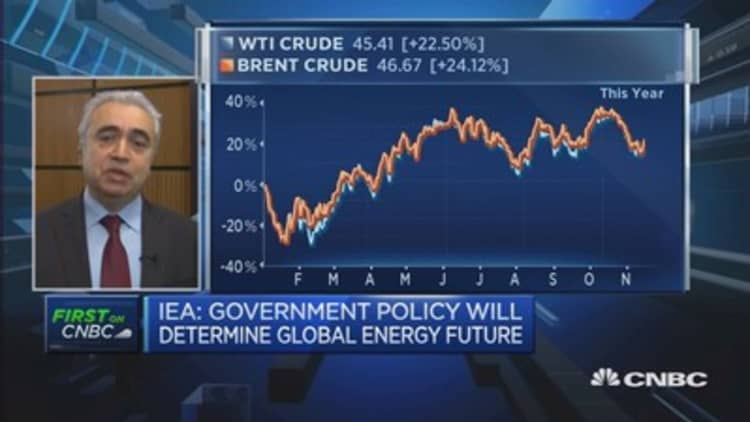Oil prices lost steam heading into Thursday's U.S. crude settlement, as expectations of an OPEC deal to limit production were offset by oversupply concerns and a rallying dollar capped earlier gains.
Saudi Energy Minister Khalid al-Falih said on Thursday he was optimistic the Organization of the Petroleum Exporting Countries would formalize a preliminary oil output deal reached in Algeria in September.
"I'm still optimistic that the consensus reached in Algeria for capping production will translate, God willing, into caps on states' levels and fair and balanced cuts among countries," he told Saudi-owned Al-Arabiya TV.
Falih said he believed the market was on its way to becoming balanced and that an agreement by OPEC at its meeting in Vienna on Nov. 30 would speed the recovery. He also said OPEC should cut oil output to 32.5 million barrels per day (bpd), the lower end of a previously agreed range.
Brent crude oil was down 37 cents a barrel at $46.26 by 2:45 p.m. ET (1945 GMT). U.S. light crude settled down 15 cents at $45.42.

The dollar rose after strong U.S. economic data and comments by U.S. Federal Reserve Chair Janet Yellen further bolstered the case for hiking rates next month.
"Two things the market is looking at: they're looking at the OPEC news, and they're looking at Janet Yellen," said Phil Flynn, analyst at Price Futures Group in Chicago. "Right now with the dollar turning positive, I think that's where we pull back."
A stronger dollar makes the greenback-denominated crude more expensive for holders of other currencies, compounding bearish sentiments from evidence of oversupply.
The market was also still under pressure from U.S. Energy Information Administration data on Wednesday that showed a larger-than-expected crude build of 5.3 million barrels in the week to Nov. 11.
Stockpiles at the U.S. delivery hub for crude futures in Cushing, Oklahoma, which the EIA said increased nearly 700,00 barrels last week, rose 303,001 barrels in the week to Nov. 15, according to traders, citing energy monitoring service Genscape.
Crude inventories were also rising elsewhere, thanks to record output by OPEC, which pumps around 40 percent of world oil supply.
"The name of the game is 'volatility' as confusing signals are arriving before OPEC meets," said Tamas Varga, senior analyst at London brokerage PVM Oil Associates.
"We have evidence of oversupply — U.S. stocks rising — versus hopes for some action by OPEC."

OPEC members are ready to reach a "forceful" agreement, Venezuelan President Nicolas Maduro said on Wednesday, following a meeting with OPEC Secretary-General Mohammed Barkindo, who described the situation as the most severe oil market crisis in 50 years.
Russia has also expressed willingness to support an OPEC decision to freeze output, Russian Energy Minister Alexander Novak said.
But rising oil production and changing fundamentals "make a credible OPEC cut all the more difficult to achieve," Jason Gammel, analyst at U.S. investment bank Jefferies, said.
"The physical market has shifted back to oversupply because of surging OPEC output, with the most material increases driven by improving security conditions in Libya and (tenuously) Nigeria," he said.
Saudi Arabia's crude oil exports rose to 7.812 million barrels per day in September as the world's top oil exporter increased shipments by 507,000 bpd versus August, official data showed on Thursday.
"The exports figures suggest that they will not give up a critical card that they are going to use in the OPEC negotiations to freeze or reduce OPEC production before they reach such an agreement at the November meeting," said Sadad al-Husseini, an energy consultant and former Saudi Aramco senior executive.

